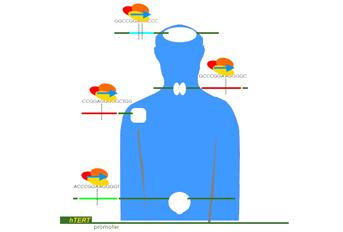Associação Portuguesa de Investigação em Cancro
Mutações no promotor da telomerase em cancro
Mutações no promotor da telomerase em cancro

A base genética da imortalidade das células tumorais está numa região inexplorada do genoma e um grupo de investigadores portugueses mostrou que uma região inexplorada do gene da Telomerase apresenta mutações que são comuns a diferentes tipos de cancro, incluindo tumores da pele, do cérebro, da bexiga e da tiróide. Neste estudo, publicado na revista Nature Comunications, a equipa de investigadores do IPATIMUP demonstra que alterações no gene da Telomerase são frequentes e estão associadas ao aumento dos níveis desta enzima nos tumores. Desde há muito tempo que se procura uma explicação para a capacidade de as células tumorais se dividirem de forma ilimitada. Uma enzima chave no processo é a Telomerase. «Com esta descoberta encontrámos um mecanismo genético que pode explicar a activação da Telomerase em tumores. O nosso estudo vem também alertar para a possibilidade de nos estarem a escapar mutações causadoras de doença em regiões ainda inexploradas do genoma», explica Paula Soares, a principal autora do estudo.
João Vinagre (1,2,*), Ana Almeida (1,2,*), Helena Pópulo (1,*), Rui Batista (1), Joana Lyra (1,3), Vasco Pinto (1,3), Ricardo Coelho (1,2), Ricardo Celestino (1), Hugo Prazeres (1,4), Luís Lima (2,5,6,7), Miguel Melo (8,9), Adriana Gaspar da Rocha (1,3), Ana Preto (1,10), Patrícia Castro (1), Lígia Castro (3,11), Fernando Pardal (12), José Manuel Lopes (1,3,11), Lúcio Lara Santos (5), Rui Manuel Reis (13,14), José Cameselle-Teijeiro (15), Manuel Sobrinho-Simões (1,3,11), Jorge Lima (1,3), Valdemar Máximo (1,3) & Paula Soares (1,3)
1. Institute of Molecular Pathology and Immunology of the University of Porto (IPATIMUP), 4200-465 Porto, Portugal
2. Institute of Biomedical Sciences of Abel Salazar, University of Porto, 4050-313 Porto, Portugal
3. Medical Faculty, University of Porto, 4200-319 Porto, Portugal
4. Portuguese Institute of Oncology—Coimbra Centre (IPOFG, EPE), 3000-075 Coimbra, Portugal
5. Experimental Pathology and Therapeutics Group, Portuguese Institute of Oncology, 4200-072 Porto, Portugal
6. Núcleo de Investigação em Farmácia, Centro de Investigação em Saúde e Ambiente (CISA), Health School of the Polytechnic Institute of Porto, 4400-330 Vila Nova de Gaia, Portugal
7. Research Department, Portuguese League Against Cancer (Norte), 4200-177 Porto, Portugal
8. Department of Endocrinology, Diabetes and Metabolism, University Hospital of Coimbra, 3000-075 Coimbra, Portugal
9. Unit of Endocrinology, Medical Faculty, University of Coimbra, 3000-548 Coimbra, Portugal
10. Centre of Molecular and Environmental Biology (CBMA), Department of Biology, University of Minho, Campus de Gualtar, 4710-057 Braga, Portugal
11. Department of Pathology, Hospital S. João, 4200-319 Porto, Portugal
12. Department of Pathology, Hospital de Braga, 4710-243 Braga, Portugal
13. Life and Health Sciences Research Institute (ICVS), School of Health Sciences, University of Minho, 4710-057 Braga, Portugal
14. Molecular Oncology Research Center, Barretos Cancer Hospital, CEP 14784-400 São Paulo, Brazil
15. Department of Pathology, Clinical University Hospital, SERGAS, Medical Faculty, University of Santiago de Compostela, IDIS, 15706 Santiago de Compostela, Spain.
* These authors contributed equally to this work. Correspondence and requests for materials should be addressed to P.S. (email: [email protected]).
Reactivation of telomerase has been implicated in human tumorigenesis, but the underlying mechanisms remain poorly understood. Here we report the presence of recurrent somatic mutations in the TERT promoter in cancers of the central nervous system (43%), bladder (59%), thyroid (follicular cell-derived, 10%) and skin (melanoma, 29%). In thyroid cancers, the presence of TERT promoter mutations (when occurring together with BRAF mutations) is significantly associated with higher TERT mRNA expression, and in glioblastoma we find a trend for increased telomerase expression in cases harbouring TERT promoter mutations. Both in thyroid cancers and glioblastoma, TERT promoter mutations are significantly associated with older age of the patients. Our results show that TERT promoter mutations are relatively frequent in specific types of human cancers, where they lead to enhanced expression of telomerase.
Revista:
NATURE COMMUNICATIONS | 4:2185 | DOI: 10.1038/ncomms3185
http://www.nature.com/naturecommunications




